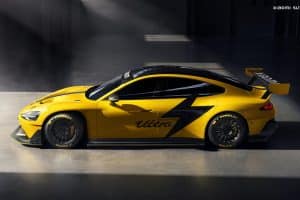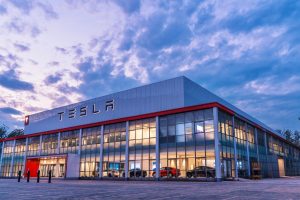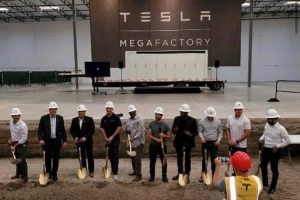Tesla and Formula E: Will it ever happen? Probably not. At least, that’s what Elon Musk says, and he believes that production and scalability are more important. For the global EV scene, they certainly are, while professional motorsports are really just a trivial part of what Tesla does. While the company does build and create some of the fastest and highest-performing cars on Earth, it has no intentions of bringing them to a track or becoming a car company dedicated to winning shiny trophies. However, this didn’t stop other car companies from adopting different strategies.
Some companies, like BMW and Audi, for example, did their work in reverse. Years ago, when the Formula E Series became a real thing, these two companies were among the first to build a single-seat, all-electric powertrain that was extremely similar to the blazing fast F1 circuit. The only difference was that these new, sustainable racecars weren’t blaring loud motors for everyone to hear.
Instead of developing mass-market vehicles that would benefit the company in a multitude of ways, these automakers chose to work in reverse. Not focusing on building a reliable EV software infrastructure or production facilities to manufacture them in, German car companies went to their roots and focused o a few fast cars that would compete on the weekends at some of the toughest circuits in the world. But the problem is, they could have killed two birds with one stone by doing things in the correct order, which brings me to my next point: Tesla is already primed for Formula E, and it never had any intentions of competing.
A recent article from Bloomberg shows that BMW has decided to officially scrap its Formula E team at the end of this season, shifting its focus from racing and toward an intensifying EV market. The money it will save from not focusing on turning out fast laps at world-famous circuits will now be dedicated to developing EVs for consumers.
In the time that BMW has been racing in Formula E, it has only released one car: the i3, a boxy, widely unpopular car aesthetically. With plans to launch the iX, which it unveiled just last month, there are plenty of opportunities to establish a competitive lineup of all-electric cars in the future. But the focus has been all wrong from the start.
BMW didn’t have an overwhelmingly successful time in Formula E. Since it started racing in the series, which held its first race seasons ago, it has won only four races. But the company stated that it has “exhausted the opportunities to transfer Formula E’s pioneering racing technologies into passenger models.”
This is where the order of development may have been more advantageous for BMW. Now that their Formula E run is over, they have nothing to base passenger models off of, which pretty much puts them at square 1 if you take into account the i3 is not a widely popular or successful EV, to begin with.
This is where Tesla gains a real advantage in a hypothetical scenario where it would build cars for a racing series. Tesla has passenger vehicles now that could compete in several racing series, and other cars that actually have competed in racing forums like the Pikes Peak Hill Climb.
For example, the Roadster is 0-60 in 1.9 seconds, has a quarter-mile acceleration of 8.8 seconds, and seats four people. The powertrain is already powerful enough to compete in some racing circuits, but if Tesla were to refine it slightly and build a new, more reliable chassis that would benefit racing scenarios, there is no reason that the Next-Gen Roadster wouldn’t be extremely competitive in some racing series.
The Model S Plaid is another example. It has broken multiple records, including one at the Nürburgring in Germany (which is unconfirmed) and the Laguna Seca Raceway in California. It already has the handling, speed, and downforce to take on tough tracks that are windy and difficult to maneuver. It would just take some minor refinements to make it a “racecar.”
This is where Tesla gains a significant advantage in its structure. It is irrelevant whether the company will actually race some of its cars or not, but it would be ready today if it chose to. Meanwhile, other car companies decided to build racecars first, and after seven years of R&D, they have nothing that would contribute to a highly-effective passenger car. It is like baking a cake before putting any of the ingredients together.
It doesn’t bode well for these foreign automakers, either. Unfortunately for them, Tesla is pulling away. Every day, it seems like the company is improving in range or performance or battery tech that makes its lead in the EV sector a little bit bigger than before. Now, it has four passenger cars on the road: Two sedans, a crossover, and an SUV. It has a Supercar on the way, a truck coming in the next year, a Semi that will be launched shortly. The list goes on and on, it seems, and if Tesla wanted to race a car this weekend and be competitive, it could.
It almost sounds like the priorities of these highly-complex German car companies were simply out of line. They chose to do the fun stuff first instead of focusing on the real task at hand: Getting gas cars off the road and putting electric ones on it. Instead of worrying about the issues surrounding the manufacturing processes of EVs, which took Tesla several years to figure out (and it is still a work in progress), BMW will be forced to make a full-scale commitment if it wants to be competitive within the next ten years. The decision it made could be detrimental to the future development of the company’s EV fleet. It certainly has its work cut out for it.
And if you’re wondering, Musk said Tesla would not get into racing. The big picture deals with manufacturing and scalability, and racing is really the last of the CEO’s concerns.
Original Publication by Joey Klender at Teslarati.
Want to buy a Tesla Model 3, Model Y, Model S, or Model X? Feel free to use my referral code to get some free Supercharging miles with your purchase: http://ts.la/guanyu3423
You can also get a $100 discount on Tesla Solar with that code. Let’s help accelerate the advent of a sustainable future.





